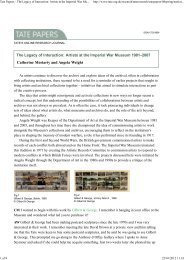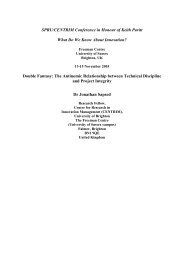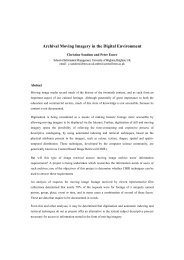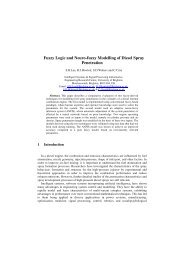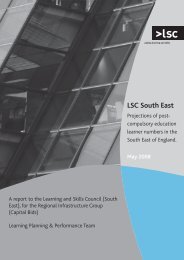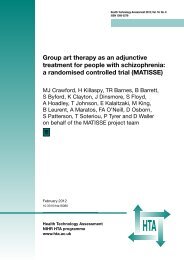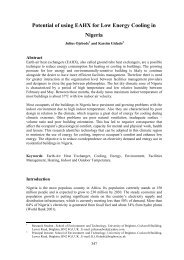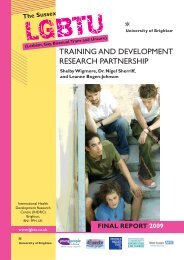TOP TIP - University of Brighton Repository
TOP TIP - University of Brighton Repository
TOP TIP - University of Brighton Repository
Create successful ePaper yourself
Turn your PDF publications into a flip-book with our unique Google optimized e-Paper software.
INTRODUCTION<br />
6<br />
Supporting Young Fathers<br />
the document ‘Supporting Parents and Carers’, it states that ‘In the past, public<br />
policy has paid insufficient attention to supporting parents and helping families find<br />
solutions for themselves’. It goes on to acknowledge the need to build responsive<br />
and flexible services to support children that involve parents without excluding<br />
fathers:<br />
‘…the government would like to develop more and better universal services…which<br />
could include…support programmes for fathers as well as mothers so that all<br />
children, but especially those who are living apart from their fathers, develop<br />
positive relationships with both parents.’<br />
ECM is important because it has led to children and young people’s services<br />
being radically reshaped to bring about a new focus on the prevention <strong>of</strong> poor<br />
outcomes. Such an emphasis <strong>of</strong>fers a unique opportunity to develop services that<br />
relate to families as a whole (i.e. including fathers), rather than just parts <strong>of</strong><br />
them.<br />
Young fathers and services<br />
A growing body <strong>of</strong> research (Pollock et al., 2005; Ryan, 2000; Quinton et al.,<br />
2002) suggests that services <strong>of</strong>ten exclude young men through a combination <strong>of</strong><br />
‘traditional’ mother-focused approaches, ignorance <strong>of</strong> male perspectives, and<br />
sometimes through overt discrimination. Services that cater for young parents<br />
almost invariably focus on young mothers, and even where they also aim to<br />
support young fathers, they <strong>of</strong>ten struggle to find ways to do this effectively (e.g.<br />
Ghate et al., 2000; Ryan, 2000).<br />
In their report examining research findings relating to fathers involvement with<br />
social care services, Ashley et al., (2006, p.19) point out that practitioners are<br />
<strong>of</strong>ten reticent about engaging fathers in services because <strong>of</strong> the ‘possible impact<br />
on women and children attending who may have experienced domestic violence, and<br />
because <strong>of</strong> more generalised concerns and worries about child sex abuse’. This<br />
means that in many instances, pr<strong>of</strong>essionals are continuing to juggle with<br />
constructions <strong>of</strong> the father as a ‘risk’ vs. the father as a ‘resource’ (Featherstone,<br />
2001). In their study <strong>of</strong> young prospective Black fathers, Pollock et al., (2005)<br />
also highlight how young men are excluded by services. The authors found that<br />
the young men were committed to involvement in fatherhood and the future care<br />
<strong>of</strong> their child. However, the authors report that the young men’s experiences <strong>of</strong><br />
antenatal care at the hospital, together with extensive involvement <strong>of</strong> the<br />
mother’s family and friends, tended to reinforce feelings <strong>of</strong> being marginal to the<br />
pregnancy. Consequently, Pollock and her colleagues, argue that there is a need<br />
to challenge the established ways <strong>of</strong> working with young fathers in maternity<br />
provision in order to promote the development <strong>of</strong> more father-inclusive services.<br />
Practices focusing almost exclusively on the mother are deeply embedded within<br />
the teenage pregnancy sector, and probably stem from an understandable desire<br />
to empower and respect the young mothers whom agencies are in contact with.<br />
But there is a lack <strong>of</strong> confidence and clarity in many local programmes and<br />
services about how to work effectively with both young mothers and young<br />
fathers. Practitioners who are used to working with young mums <strong>of</strong>ten find it<br />
hard to understand the relevance <strong>of</strong> young fathers to their work (Burgess,<br />
2006a). As a result, even services that do engage with young men place little<br />
value on their roles as fathers, and rarely ask questions about parental status as<br />
a matter <strong>of</strong> course. Services that have not been proactive in trying to engage with<br />
young fathers are not held sufficiently to account for this failure, either locally



